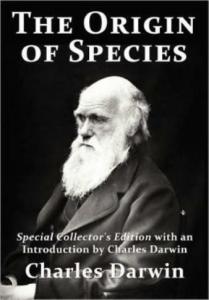 In at least modern times, the Englishman Charles Darwin (1809-1882) has been the most influential person regarding the origin of the human species. As a naturalist and biologist, and then a geologist, he postulated evolutionary biology–that all biological life descended from a single, common ancestor.
In at least modern times, the Englishman Charles Darwin (1809-1882) has been the most influential person regarding the origin of the human species. As a naturalist and biologist, and then a geologist, he postulated evolutionary biology–that all biological life descended from a single, common ancestor.
Yet in Darwin’s early adult life, he was a professing Christian, and his mother and wife were devout Christians and churchgoers. So, how did Charles Darwin go from firmly professing to being a Christian to gradually becoming a theistic evolutionist and finally an agnostic? Yet he is buried in Westminster Abbey, as if the Anglican Church accepted him as a Christian. (See my earlier post, “Charles Darwin’s Beliefs about Religion.”)
Charles Darwin began higher education at the University of Edinburgh Medical School. But because he was bored with medical studies, his father sent him to Christ’s College, Cambridge, to become an Anglican clergyman. While there, Charles became interested in natural theology and laws of science, which changed the course of his life and work.
Charles Darwin then set sail on the HMS Beagle in 1831, at the tender age of 22, on a five-year voyage to explore the earth–mostly the coastlands of South America–as a naturalist and a biologist. As he began this voyage, he was firmly a professing Christian who had no doubts about the truth of the Bible. But his discoveries during this voyage led him away from this religious profession.
In 1938, two years after the voyage, Charles Darwin first proposed his theory of natural selection. It was that organisms adapted to their various environments to generally produce improved offspring. Darwin was encouraged that this theory coincided with Charles Lyell’s well-known concept of geological uniformitarianism.
Thus, after this voyage on the HMS Beagle and for the remainder of Charles Darwin’s life, he vacillated about believing in the existence of a divine being who created the universe. He thought very much about throughout his life. It was a bone of contention in his household between him and his wife Emma throughout both their courtship and marriage. For years, Charles attended Sunday church worship services with his family. But by 1849, he was escorting his family to church and then taking a long walk.
Thus, Charles Darwin delayed publishing his revolutionary book, On the Origin of Species by Means of Natural Selection (1859), apparently due to fear of criticism from both the Anglican Church as well as the scientific community.
So, Darwinian evolution maintains that humans evolved from apes. This is certainly contrary to many portions of the Bible that touch on the origin of humans, especially the first chapter of Genesis. It clearly states, “God created humankind in his image, in the image of God he created them, male and female he created them” (Genesis 1.27 NRSV). And Genesis soon reiterates likewise, “When God created humankind, he made them in the likeness of God. Male and female he created them” (5.1-2; cf. 9.6). That does not seem to comport with man descending from monkeys.
Genesis 1 also says God did this after he created animals “of every kind” and “male and female” (vv. 20-25). But Darwin claimed the different kinds of animals evolved from each other, thus not just an evolution within the various kinds.
Darwin defended theistic evolution in a letter in which he asserted that it is “absurd to doubt that a man might be an ardent theist and an evolutionist.” And he revealed in another letter, written in 1879, “I have never been an atheist in the sense of denying the existence of a God. I think that generally . . . an agnostic would be the most correct description of my state of mind.”
Darwin felt great remorse when his father died. He afterwards wrote in his autobiography, “I can indeed hardly see how anyone ought to wish Christianity to be true; for if so the plain language of the [New Testament] text seems to show that the men who do not believe, & this would include my Father, Brother & almost all my best friends, will be everlastingly punished. And this is a damnable doctrine.” Darwin probably had in mind Jesus’ statement in Matthew 25.46.
Darwin’s wife Emma was so upset with this statement by her husband that she excised it from the first edition of his autobiography, so that it was later included by Darwin’s daughter.
Well, I used to believe in the eternal punishment of unbelievers because that is what I was taught in church. But I later came to realize that the Bible more likely does not say that. Thus, I am an evangelical who believes in salvation through Jesus’ atoning death while also being a conditionalist who believes in some form of annihilation. So, I am an open theist, and that is what many conditionalists believe–that the human soul is not immortal and that God imputes conditional immortality at the resurrection. I have somewhat of a Methodist background, and many Methodist scholars are open theists.
It is some Greek philosophers, such as Philo, who asserted that the human soul is immortal. Later Jews and Christians adopted that belief, obviously finding it more palatable than what earlier Jews and Christians believed. But Jesus taught otherwise when he said, “Do not fear those who kill the body but cannot kill the soul; rather fear him who can destroy both soul and body in hell” (Matthew 10.28).
So, you can certainly be an evangelical Christian, as I believe I am, and not believe in eternal punishment of all unbelievers. Thus, in my view, Darwin should not have rejected the Christian message simply because eternal torment of the wicked was most commonly believed by Christians of his time. That is something they could have been wrong about, as I believe they were and still are today. Yet, belief in conditionalism has been increasing among evangelicals in recent decades.
When Jesus said unbelievers will “perish” (John 3.16; cf. 10.28), I think he meant go out of existence. It’s like he taught in some parables that at the judgment, the “weeds” and the pruned “branches” will be cast into fire and thereby become ashes (Matthew 13.30; John 15.6). As for Daniel 12.2 and Matthew 25.46, I think these texts teach eternal shame for the wicked, not them experiencing conscious, eternal punishment.
Darwin wrote in a letter in 1860 to American botanist Asa Gray that he “had no intention to write atheistically.” But he continued, “I cannot see as plainly as others do . . . evidence of design and beneficence on all sides of us. There seems to be too much misery in the world.” That, of course, is a major reason people adopt atheism, thinking that a good and moral deity could not possibly have created earth with its suffering. But for me, the explanation in Genesis 3 suffices, that God tested the first humans and they failed the test, throwing subsequent human life into much sin, pain, and death.
But I don’t think that is how God created earth and life here in the beginning. For example, Genesis says God made only plants and fruit as food for both humans and animals (Genesis 1.29). But that later changed, so that both humans and many animals became carnivorous. Genesis 6-7 says God destroyed the earth with a flood in Noah’s day because “all flesh,” thus both humans and animals, “had corrupted its ways upon the earth,”and “the earth is filled with violence” (Genesis 6.12-13). I address this in my book, Moses Predicted COVID-19.
In conclusion, according to the book of Genesis, God created humans and animals as non-violent vegetarians; but our early ancestors changed all of that by bringing this suffering and death upon us. From this perspective, it is not God who is to blame for “much misery in the world,” as Darwin and countless others suppose, but the first humans.
Then, am I saying humans did not have to take the forbidden fruit and eat it, that the failure that divine test was not preordained by God? That is exactly what I’m saying!













